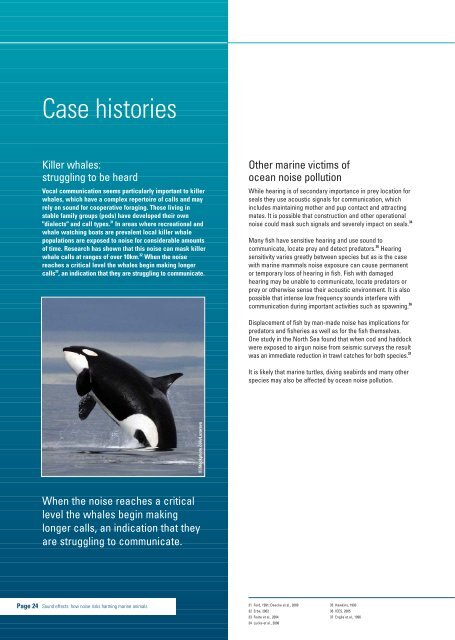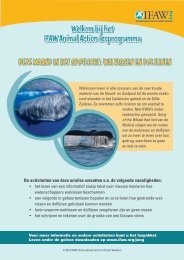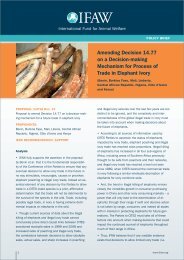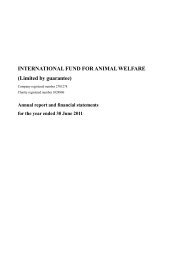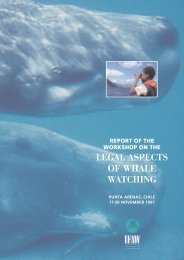Ocean Noise: Turn it down - Ocean Conservation Research
Ocean Noise: Turn it down - Ocean Conservation Research
Ocean Noise: Turn it down - Ocean Conservation Research
Create successful ePaper yourself
Turn your PDF publications into a flip-book with our unique Google optimized e-Paper software.
Page 24<br />
Case histories<br />
Killer whales:<br />
struggling to be heard<br />
Vocal communication seems particularly important to killer<br />
whales, which have a complex repertoire of calls and may<br />
rely on sound for cooperative foraging. Those living in<br />
stable family groups (pods) have developed their own<br />
"dialects" and call types. 31 In areas where recreational and<br />
whale watching boats are prevalent local killer whale<br />
populations are exposed to noise for considerable amounts<br />
of time. <strong>Research</strong> has shown that this noise can mask killer<br />
whale calls at ranges of over 10km. 32 When the noise<br />
reaches a cr<strong>it</strong>ical level the whales begin making longer<br />
calls 33 , an indication that they are struggling to communicate.<br />
When the noise reaches a cr<strong>it</strong>ical<br />
level the whales begin making<br />
longer calls, an indication that they<br />
are struggling to communicate.<br />
Sound effects: how noise risks harming marine animals<br />
©iStockphoto.com/Lazareva<br />
Other marine victims of<br />
ocean noise pollution<br />
While hearing is of secondary importance in prey location for<br />
seals they use acoustic signals for communication, which<br />
includes maintaining mother and pup contact and attracting<br />
mates. It is possible that construction and other operational<br />
noise could mask such signals and severely impact on seals. 34<br />
Many fish have sens<strong>it</strong>ive hearing and use sound to<br />
communicate, locate prey and detect predators. 35 Hearing<br />
sens<strong>it</strong>iv<strong>it</strong>y varies greatly between species but as is the case<br />
w<strong>it</strong>h marine mammals noise exposure can cause permanent<br />
or temporary loss of hearing in fish. Fish w<strong>it</strong>h damaged<br />
hearing may be unable to communicate, locate predators or<br />
prey or otherwise sense their acoustic environment. It is also<br />
possible that intense low frequency sounds interfere w<strong>it</strong>h<br />
communication during important activ<strong>it</strong>ies such as spawning. 36<br />
Displacement of fish by man-made noise has implications for<br />
predators and fisheries as well as for the fish themselves.<br />
One study in the North Sea found that when cod and haddock<br />
were exposed to airgun noise from seismic surveys the result<br />
was an immediate reduction in trawl catches for both species. 37<br />
It is likely that marine turtles, diving seabirds and many other<br />
species may also be affected by ocean noise pollution.<br />
31 Ford, 1991; Deecke et al., 2000<br />
32 Erbe, 2002<br />
33 Foote et al., 2004<br />
34 Lucke et al., 2008<br />
35 Hawkins, 1993<br />
36 ICES, 2005<br />
37 Engås et al., 1996


